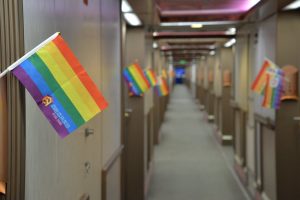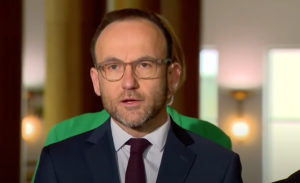One Nation proposes mass reform to NSW education

Kids to be taught reading and writing, NOT gender fluidity under back-to-basics election proposal to rid NSW classrooms of creeping indoctrination.
Teachers would be prevented from discussing LGBTQI matters or engaging in discussions about ‘culture wars’ under proposed reforms to the NSW education system.
One Nation’s Mark Latham today unveiled his party’s education policy, which will limit the scope a teacher has in the classroom to a more traditional curriculum.
The proposed policy extends across Catholic, Independent and public schools and vows to clamp down on ‘unnecessary’ curriculum points which draw focus from core learning areas.
The party is hoping to secure four seats – up from the two they currently hold – at the NSW election on March 25, which could potentially give them the balance of power.
If successful, the newly formed government would be required to work with One Nation to effectively govern.
Mr Latham summarised the proposed reform in an 11-point policy which encourages performance-based pay for teachers and a blanket ban on gender fluidity lessons, which he has branded ‘a form of child abuse’.
‘In the Leftist march through institutions, schools are now in the frontline of the culture wars,’ the manifesto reads.
‘The attempt to displace the role of parents must be reversed. A starting point is to eliminate woke political content and teaching in the classroom.’
Mr Latham noted there are 17,000 students in NSW who begin high school with limited basic reading and writing skills.
He said international testing determined the average 15-year-old NSW student is ‘four years behind their Chinese counterparts in mathematics and 3.5 years behind in science’.
The same age group are almost 18 months behind where a student would have been in NSW in 2000, Mr Latham said, describing a ’20-year downward trend’ in the state’s academic output.
‘NSW is now in the second tier of Australian school results, behind the ACT, Victoria, Western Australia and even Queensland,’ he said.
‘This is a full-blown crisis for our state.’
Mr Latham said literacy and numeracy classes have fallen to the wayside to ‘find time and space for junk lessons on gender fluidity… full of fads, experiments, woke political nonsense and an over-emphasis on ‘student wellbeing’ (with some schools resembling community health centres instead of centres of academic excellence).
High School English has become a long-running tutorial in gender studies… At some schools, there is now more indoctrination than education.’
The One Nation education policy will demand ‘explicit teaching’ in which a teacher will be once again required to stand at the front of a classroom directing students.
Focus would again return to literacy, numeracy, history, science and ‘other basics’, Mr Latham said, leaving no room for discussions on race, gender and sexuality.
The policy slams modern teaching methods in which children are given the opportunity to be ‘self starters’ and explore the curriculum at a more individualised pace.
A review of the NSW curriculum last took place in 2020 and concluded that a change was necessary to give students the best possible opportunity to succeed.
Teachers complained that they’re expected to get through too many syllabus points, without enough time to thoroughly teach each section.
Speaking to Daily Mail Australia, one teacher said it’s ‘almost impossible’ to get through everything that is now expected of them.
‘Class numbers are only getting bigger each year, and we’re expected to cover more than ever,’ the grade four teacher said.
‘It’s really just driving us away from the profession… I got into teaching because I love children, but it’s hard to keep up that passion.’
Data shows teachers are leaving the industry in droves, primarily fuelled by burnout.
But Mr Latham’s policy also noted the government’s vaccination policy during Covid forced some teachers out of the profession.
He’s vowed to reinstate the jobs of individuals who were stood down as a result of the mandates.
One Nation will also advocate for parents to have a legal right to pull their children from classes that do not align with personal morals and beliefs and a ‘no surprises’ policy, which would ensure all teaching points were thoroughly explained to parents ahead of time.
As part of the 11-point policy, Mr Latham would implement a blanket ban on phones in schools, encouraging ‘genuine face to face interactions in the playground’ and allowing students to focus on education in the classroom.
Finally, Mr Latham is calling on schools to seek approval from parents before engaging in any discussion with students aged under 18 about gender fluidity or potential gender transitions.
‘If teachers need to express their politics they can run for parliament, rather than using their students as political guinea pigs,’ he said.








